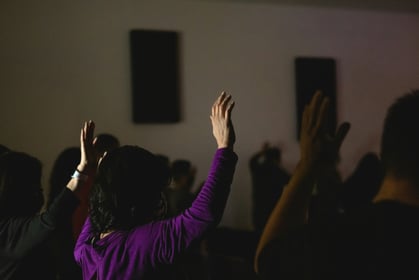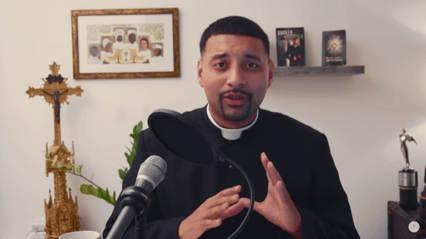Many of us might feel overwhelmed about everything we need to do this Christmas season: buying gifts (even if predominantly online), preparing meals, desserts, and cookies, reaching out to loved ones, and setting time aside to intentionally—and prayerfully!—reflect on Christ’s coming. On top of all this, we’re contending with the anxiety of trying to celebrate safely and the sadness of not being able to spend Christmas with some of our loved ones or engaging in the social traditions we usually do this time of year.
With so much on our minds, it can be exceedingly challenging to remain present. So, what are some practices that we can adopt that will actually help us be present this Christmas season?
Commit to Certain Types of Prayer
Recently I was spending a lot of time in my head. Having just started a graduate program, I was struggling to ground myself in the present moment (all of the thinking and reading I was doing was making it hard). I was distracted at Mass, unable to follow conversations with friends over the phone, lying awake in bed with a restless mind, and so on. I was certainly not doing a good job of living presently.
My spiritual director suggested a type of contemplative prayer known as “centring prayer” (he specifically recommended I read a book called Into The Silent Land by Martin Laird, which I also recommend). I began spending twenty minutes a day, sometimes twice a day, simply repeating the “Jesus Prayer.” There are different variations of the prayer, but here is one:
“Lord Jesus Christ, Son of God, have mercy on me, a sinner.”
We can even just repeat the name “Jesus” over and over again, which is what I started doing.
I began sitting in a comfortable posture for twenty minutes and repeating His name on every exhale of my breath, allowing our Lord’s name to pull me from my busy thoughts and place me under the peaceful, present gaze of Christ. This has been incredibly helpful. I am generally calmer and more consistently present than I was before beginning this practice.
Of course, any prayer can help us live presently, and this is just one example.
The more we can commit ourselves to prayer and be open to what God is doing in our lives in this very moment—not in the past or the future—the more we can live in the present with gratitude for His love for us.
Make Time for People and Activities We Enjoy
Do you ever have moments when you’re spending time with someone and suddenly realize two hours have passed in what felt like fifteen minutes? Whether we’re having dinner with a good friend, messing around on an instrument, or going on a beautiful hike, there are times when we are so presently focused on what we’re doing that everything else falls away. These are wonderful experiences and, I think, moments when we are so present that we aren’t even consciously aware that we are (if that makes sense!).
This experience is known as “flow,” and was studied extensively by the psychologist Mihaly Csikszentmihalyi. We can experience “flow” when we’re doing something that is both engaging and that we’re competent at, such as cooking, writing, woodworking, playing with our children, and countless other things (we each have different activities that will give us “flow”). Not only is this a great and enjoyable way to live presently, but it also has a host of benefits to our health. The more we experience “flow,” the better and more satisfied we are.
I think this can be especially important this season when there is much to be worried about. Moments of “flow” can remind us of the joy and gift of each moment.
So, perhaps we can think of people who help us live more presently in this way and be intentional about spending time with them this season. Or we can make sure to do things we enjoy, to rejuvenate ourselves so that we’re more patient and loving as we tackle our to-do lists. And maybe something that leads to “flow,” like baking or knitting, can not only help us live more presently but allow us to share its fruits—those cookies or home-made scarves—with others out of love.
Limit Things that Remove Us from the Moment
It can be hard to remain present if we’re constantly reading the news, sailing through social media platforms, or binging on movies and shows (even Christmas-themed ones). While none of these things are bad, of course, they can make it hard to live presently if we spend too much time doing them.
Personally, the more I’m engaged in these types of things throughout the day the more restless I begin to feel and the less I’m able to be present. I start thinking too much about the future or worrying about something (and there is no shortage of things to worry about these days). And so instead of enjoying a meal or having a conversation with a loved one or even enjoying a walk around the neighbourhood at dusk, I’m off somewhere else that definitely isn’t the present moment.
Since I know this about myself, I do my best to limit these things. Some people have specific social media cut-off times (app alerts are turned off after 7 pm, for instance) or only allow themselves a certain amount of TV during the week. What is helpful, though, is not to simply cut out something but to find something to replace it. Maybe we can swap out some time spent online for contemplative prayer? Maybe we realize we actually do have time to lose ourselves to “flow” with some minor changes?
The more aware we are of what we’re doing each day the more we’ll notice what things tend to keep us more in our head—planning for the future, reliving the past, or worrying about getting stuff done. Sometimes we need to think about those things, of course, but if we’re doing it too much then we lose the precious gift that is the present moment. And it is precisely in the present moment where we find God’s presence and that of our loved ones. By figuring out which things tend to pull us away, and doing what we can to limit them, we’ll likely find it much easier to remain present.
Ultimately, the more we’re able to live presently the more content we will likely feel (there are actually studies backing this up!) and the more we can experience God’s presence. And so, whether it’s committing ourselves to certain forms of prayer, spending more time with people we love, making time for activities we enjoy, or being more discerning about what keeps us from living in the moment, the more we adopt some—or all!—of these things the more likely we are to remain present this Christmas season.
Did you enjoy the read? Here are more recommendations.



